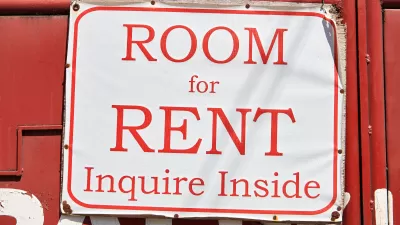Kaid Benfield takes a moment to reflect on the changing nature of the American household and how it will shape our cities in the coming years.

Ah, the holiday season – a time to gather around the table with loved ones, to keep old traditions alive, to make new ones as our families change and grow. Traditionally, the nuclear family has been painted as an anchor for these traditions, but Benfield poses some challenging questions for that particular, conventional view of American society.
"Does our storytale version of family life resemble real family life? Does it exclude people who are not part of or close to their families? Is the concept of 'family' changing, with implications for the planning profession? The answers are, of course, seldom; usually; and definitely."
According to recent reports from the U.S. Census Bureau, the American household is becoming an increasingly heterogeneous thing. Households composed of individuals, unmarried couples, and never-married single mothers are all on the rise, as two-parent families (especially those with working fathers and stay-at-home mothers) have followed a steady decline since the 1960s.
That's not to say, of course, that two-parent families have fallen into obscurity; they still represent a solid majority of all family households.
"Rather, we have a diverse and changing array of household types and circumstances that smart planners and businesses will seek to accommodate. The census data show that the growing parts of the housing market are nonfamily households, smaller households including people living alone, unmarried couples, single-parent households with kids, and older households."
FULL STORY: Meet the modern American family

Alabama: Trump Terminates Settlements for Black Communities Harmed By Raw Sewage
Trump deemed the landmark civil rights agreement “illegal DEI and environmental justice policy.”

Planetizen Federal Action Tracker
A weekly monitor of how Trump’s orders and actions are impacting planners and planning in America.

How Atlanta Built 7,000 Housing Units in 3 Years
The city’s comprehensive, neighborhood-focused housing strategy focuses on identifying properties and land that can be repurposed for housing and encouraging development in underserved neighborhoods.

In Both Crashes and Crime, Public Transportation is Far Safer than Driving
Contrary to popular assumptions, public transportation has far lower crash and crime rates than automobile travel. For safer communities, improve and encourage transit travel.

Report: Zoning Reforms Should Complement Nashville’s Ambitious Transit Plan
Without reform, restrictive zoning codes will limit the impact of the city’s planned transit expansion and could exclude some of the residents who depend on transit the most.

Judge Orders Release of Frozen IRA, IIJA Funding
The decision is a victory for environmental groups who charged that freezing funds for critical infrastructure and disaster response programs caused “real and irreparable harm” to communities.
Urban Design for Planners 1: Software Tools
This six-course series explores essential urban design concepts using open source software and equips planners with the tools they need to participate fully in the urban design process.
Planning for Universal Design
Learn the tools for implementing Universal Design in planning regulations.
Jessamine County Fiscal Court
Caltrans
Institute for Housing and Urban Development Studies (IHS)
City of Grandview
Harvard GSD Executive Education
Toledo-Lucas County Plan Commissions
Salt Lake City
NYU Wagner Graduate School of Public Service





























